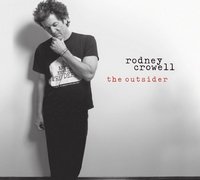
"The Outsider"
Columbia Records
CD REVIEW: RODNEY CROWELL, "THE OUTSIDER"
Get this guy started and enjoy the treat
By Barry
Gilbert
St. Louis Post-Dispatch
August 23, 2005
 |
Rodney
Crowell "The Outsider" Columbia Records |
You do not, Rodney Crowell advises in "Don't Get Me Started," want to be on the next barstool when the subject turns to the state of the world. Because Crowell is not happy, and he's got a lot to say.
On the other hand, better it be Crowell than the "hometown Bubba" in "Say You Love Me" who "went a little too far/He said he don't like Catholics he don't like Jews/He don't like me and he don't like you."
"The Outsider" completes a three-album roll that Crowell began with the autobiographical "The Houston Kid" in 2001. He expanded his scope with "Fate's Right Hand" two years later. And now Crowell has learned to say what he needs to say without, for the most part, preaching or flirting with being pretentious. On "The Outsider," characters do the ranting. That the ranting is done over some first-class rootsy rock is a welcome bonus.
Crowell began his career as a kid in Nashville sitting around Guy Clark's dining-room table with the likes of Steve Young and Steve Earle. He went on to write a hit for Waylon Jennings, play guitar for Emmylou Harris and marry Johnny Cash's daughter Rosanne. And he became one of the hottest country singers in Nashville with "Diamonds & Dirt" in 1989.
But Crowell was also always more than that, and his serious -- noncommercial -- side has taken over full time.
"The Obscenity Prayer," for example, is a reverse psychology condemnation of greed ("give to me my Aspen winter/Sorry bout the World Trade Center/I can't help the ones in need/I've got my own mouth to feed").
"The Outsider" campaigns for some sort of middle ground between rich and poor, winning and losing, and red and blue ("I don't have to be straight/You don't have to be something I hate"), and Emmylou Harris and John Prine help out with the self-explanatory "Ignorance Is the Enemy."
Crowell ponders reaching for your best in "Beautiful Despair," equating it with "hearing Dylan when you're drunk at 3 a.m./Knowing that the chances are . . . you'll never write like him," and then covers the master with Harris on "Shelter From the Storm."
Then he changes up completely with a love song to a "Glasgow Girl."
The irony here is that Crowell
probably will remain an outsider to mainstream music fans,
instead preaching to the choir in concert and on Americana-format
radio. And a lot of people will miss some of his best work.